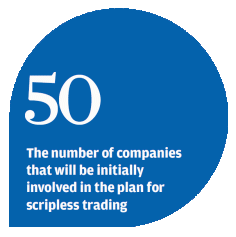Scripless share proposal falls short, lawmakers tell officials
Questions raised over plan to start digital share records with small number of companies
A government proposal for a scripless stock exchange does not go far enough, legislators said.

Andrew Leung Kwan-yuen, who represents the industrial sector, said the government's proposed law change would only allow Hong Kong companies to go scripless initially. That meant only 206 of the more than 1,600 listed firms would qualify because most of them are domiciled on the mainland or abroad.
The actual number to begin using digital share records would be even smaller, with the government saying it would first allow about 50 firms to go electronic.
"It would not work if the scripless market involves only 50 companies. No investors would care about it," Leung said. "The government needs to set a clear target for all companies to go scripless."
Salina Yan, a deputy secretary of the Financial Services and the Treasury Bureau, said the government would work with overseas regulators on changes to laws to allow their companies listed in Hong Kong to use electronic shareholding records.

Elvin Yu, the managing director and head of institutional business at Allianz Global Investors, said Hong Kong should catch up with the worldwide trend for a paperless market.
"Shifting a paper-based market to an electronic market will improve administrative efficiency and reduce human input error," Yu said. "This will reduce time and money for pension providers, fund managers, custodians and other institutional investors."
Listed companies are required to issue paper share certificates, of which there are about 10 million in the city. Taiwan, mainland China and Australia have done away with physical certificates. Hong Kong wants to follow Britain, which gives investors the choice of holding digital or paper records of their shareholdings.
SFC executive director Keith Lui Kei-kwong said Hong Kong could not turn completely scripless overnight.
"Britain introduced a scripless market in 1996, but 18 years on there are still many investors who prefer to hold physical share certificates," Lui said. "In Taiwan, it took 10 years for investors to accept shareholding records electronically."

